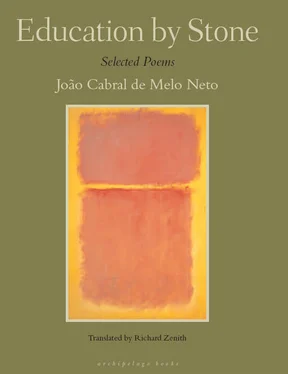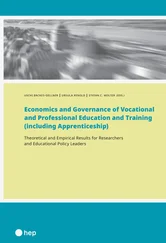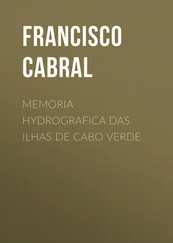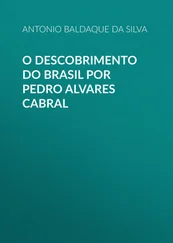II
(
Landscape of the Capibaribe
)
§Through the landscape
the river flowed
like a sword of thick liquid.
Like a humble
thickset dog.
§Through the landscape
(it flowed)
of men planted in mud;
of houses of mud
planted on islands
congealed in mud;
a landscape of mud
and mud amphibians.
§Like the river
those men
are like dogs without feathers.
(A dog without feathers
is more
than a dog that’s been stripped,
is more
than a dog that’s been killed.
§A dog without feathers
is when a tree without voice.
It is when like a bird
its roots in the air.
It is when something is so deeply
gnawed it is gnawed
to what it doesn’t have.)
§The river knew
about those men without feathers.
It knew
about their stark beards
and their painful hair
of shrimp and cotton shreds.
§It also knew
about the warehouses on the wharf
(where everything is
a huge door
without doors)
opened wide
to horizons reeking of gas.
§And it knew
about the lean, corklike city,
where bony men,
bridges and bony buildings
(everyone
dressed in duck cloth)
wither
to their intimate rubble.
§But it knew much better
the men without feathers
who wither
even beyond
their deepest rubble,
even beyond
their straw,
beyond
the straw in their hats,
beyond
even
the shirts they don’t have,
and far beyond their names,
even when written
on the driest sheet of paper.
§For it’s in the water of the river
that those men are lost
(slowly
and with no teeth).
There they are lost
(as a needle is not lost).
There they are lost
(as a clock does not break).
§There they are lost
as a mirror does not break.
There they are lost
as spilled water is lost:
without the sharp tooth
which in an instant snaps
the thread of man
in a man.
§In the water of the river
slowly
they are lost
in mud, a mud
which little by little
also cannot speak,
which little by little
acquires the cadaverous features
of mud;
the gummy blood,
the paralytic eye
of mud.
§In the river landscape
it is hard to know
where the river begins,
where the mud
begins from the river,
where the land
begins from the mud,
where man,
where his skin
begins from the mud,
where man begins
in that man.
§It is hard to know
whether that man
isn’t already
less than man
— less than the man
who can at least gnaw
at the bones of his work,
who can bleed
in the public square,
who can scream
if the millstone chews his arm,
who can have a life
that is chewed
and not just
dissolved
(in that smooth water
that softens his bones
as it softened the stones).
III
(
Fable of the Capibaribe
)
§The city is fertilized
by that flowing
sword,
by the moist gums
of that sword.
§At the end of the river
the sea extended
like a shirt or sheet
over its skeletons
of washed sand.
§(As the river was a dog,
the sea could be a flag,
blue and white
and unfurled
at the end of the journey
— or mast — of the river.
§A flag
that would have teeth
— for with its teeth and its soap
the sea is always
gnawing its beaches.
§A flag
that would have teeth
— for like a pure poet
polishing skeletons,
like a pure rodent,
a pure policeman
arranging skeletons,
the diligent sea
never stops
washing and rewashing
its pure skeleton of sand.
§The sea and its incense,
the sea and its acids,
the sea and the mouth of its acids,
the sea and its stomach
that eats, and eats itself,
the sea and its flesh
glazed like a statue’s,
its silence, achieved
at the price of always
saying the same thing,
the sea and its pure
teacher of geometry.
§The river fears the sea
as a dog fears
a door that’s cracked open,
as a beggar fears
an apparently open church.
§First
the sea pushes back the river.
The sea shuts the river out
of its white sheets.
The sea shuts its doors to all
the river’s flowers
of earth, to all its images
of dogs or beggars.
§Then
the sea invades the river.
The sea
wants
to destroy in that river
its flowers of swollen earth,
whatever in that earth
can grow and burst,
like an island,
a fruit.
§But before going to the sea
the river lingers
in stagnant mangrove swamps.
The river unites
with other rivers
in a lagoon, in swamps
where life coldly seethes.
§The river unites
with other rivers.
United,
all the rivers
prepare their fight
of stagnant water,
their fight
of stagnant fruit.
§(As the river was a dog,
as the sea was a flag,
those mangrove swamps
are an enormous fruit:
§The same patient
and useful machine
of a fruit,
the same anonymous,
invincible force
of a fruit
— still forging its sugar
when already cut.
§As drop by drop
until sugar,
so drop by drop
until the crowns of earth;
as drop by drop
until a new plant,
so drop by drop
until the sudden islands
joyously emerging.)
IV
(
Discourse of the Capibaribe
)
§The river
exists in memory
like a living dog
inside a room.
Like a living dog
inside one’s pocket.
Like a living dog
under the sheets,
under one’s shirt,
one’s skin.
§A dog, because it lives,
is sharp.
Whatever lives
doesn’t numb.
Whatever lives wounds.
Man,
because he lives,
clashes with the living.
To live
is to wend among the living.
§Whatever lives
inflicts life
on silence, on sleep, on the body
that dreamed of cutting itself
clothes out of clouds.
Whatever lives clashes,
has teeth, edges, is heavy.
Whatever lives is heavy
like a dog, a man,
like the river.
§Heavy
like everything real.
The river
is heavy and real.
As an apple
is heavy.
As a dog
is heavier than an apple.
As the blood of a dog
is heavier
than the dog itself.
As a man
is heavier
than the blood of a dog.
As the blood of a man
is much heavier
than the dream of a man.
§Heavy
as an apple is heavy.
As an apple
is much heavier
if a man eats it
than if a man sees it.
As it is even heavier
if hunger eats it.
As it is yet heavier still
if hunger sees
but cannot eat it.
§The river
is heavy
like the heaviest reality.
Heavy
because of its heavy landscape,
where hunger
deploys its secret battalions
of visceral ants.
§And heavy
because of its fable’s heavy plot,
because of the flowing
of its earthen jellies,
heavy when it gives birth
to its islands of black earth.
§Because life that multiplies
itself in more life
is much heavier,
as a fruit
is heavier
than its flower,
as the tree
is heavier
than its seed,
as the flower
is heavier
than its tree,
etc. etc.
§Heavy,
because life is heavier
when it is fought for
each day,
because the day is heavier
when it is won
each day
(like a bird
conquering each second
its flight).
from Paisagens com figuras / Landscapes with Figures 1956
Pregão turístico do Recife
Aqui o mar é uma montanha
regular redonda e azul,
mais alta que os arrecifes
e os mangues rasos ao sul.
Do mar podeis extrair,
do mar deste litoral,
um fio de luz precisa,
matemática ou metal.
Na cidade propriamente
velhos sobrados esguios
apertam ombros calcários
de cada lado de um rio.
Com os sobrados podeis
aprender lição madura:
um certo equilíbrio leve,
na escrita, da arquitetura.
E neste rio indigente,
sangue-lama que circula
entre cimento e esclerose
com sua marcha quase nula,
e na gente que se estagna
nas mucosas deste rio,
morrendo de apodrecer
vidas inteiras a fio,
podeis aprender que o homem
é sempre a melhor medida.
Mais: que a medida do homem
não é a morte mas a vida.
Читать дальше










